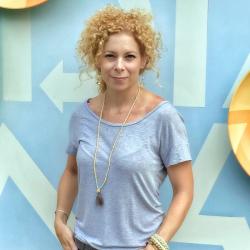These days, it seems everybody has advice on how to live better and be more successful. Much of this “help” seems centered on correcting something about ourselves or acquiring some book, drink, diet, or machine to “fix” our problems. But, in this series, we will explore accessible, thought-provoking ways to cultivate a deeper sense of ease and clarity of purpose by drawing from methods rooted in both scientific and spiritual traditions from East to West.
In a world filled with competition, tension, and a seemingly endless amount of tragic news and negativity, is it possible to feel more fulfilled than ever? Could we make more confident choices, living with a sense of peace and happiness? Is it possible to accomplish more while also being at ease? How can we maintain the mindset of being enough, of having enough, rather than suffering from a sense of scarcity, yearning, and grasping?
What if the simplest answer is “Know thyself”?
Think of that! How well do you really know yourself? We spend a great deal of time focused outwardly by taking on the expectations and goals of our families and society — sometimes without much thought. But what do you truly value? What do you find beautiful in life? What brings you joy? Do you ever think about your own personality or the reactions you tend to have when something bad (or good!) happens?
Much of the conflict and dis-ease in our lives is, in essence, a conflict between who we truly are (our hearts’ desires and our values) and the choices we make (our behaviors). When these two aspects of our being — our true self and our choices — are out of sync, so, then, are our lives.
We give our power away when we allow our conditioned patterns, reactiveness, and habits to determine the choices we make, rather than making choices from a true understanding of ourselves. For example, some of us have established solid routines and supportive patterns surrounding the benefits of eating well, exercising, and getting enough sleep. A setback, though, often triggers less-helpful patterns and reactions that throw us out of balance. We might reach for a quart of ice cream, indulge in mindless negativity on social media, or stay up too late. Mindful awareness helps us to know when we are trading our values for comforts, and it helps us to choose our integrity over short-term gains.
To truly understand and make use of this exploration of self, we need to acknowledge where we are coming from and where we want to be. There is nothing to “fix”; we are simply tapping into who we are and choosing to move through life from that space. The first step in this process is to understand our core values and using them to create a foundation for this exploration.
The first exercise, focused on identifying values and ethics, draws from the Buddhist tradition, among others, as well as an exercise used by sociologist Brené Brown. Understanding what we find to be beautiful about our lives and committing to our own values gives us perspective. Cultivating introspection and the practice of remembering our own values builds self-confidence and self-respect. We are able to make better choices from a place of self-knowledge. When we have a lapse in judgment or stray from our intentions, we can remember what we believe in and how we want to be. This remembering allows us to choose kindness and compassion toward ourselves, rather than guilt. We can move toward our goals with integrity.
Finding Our Anchors: Goals, Values, and Intention
Although there are many interpretations, for the purpose of this exercise, goals, values, and intentions are defined as follows:
Goals: future accomplishments or ambitions
Goals will change many times throughout our lives and even in the span of a single day. Goals can be big — marriage, job promotions, owning a home, making millions, traveling the world, or founding a charity. Goals can be small — getting through your next homeowners association meeting, making it to the gym, or binge watching Game of Thrones.
Take a moment to list your current goals. Include long-term and short-term personal, professional, and relationship goals.
Values: personal attributes characterizing who you are and what you fundamentally believe
Values are personal and fixed. They are deeply held core beliefs.
Take a few minutes to review the list of values above (or search “list of values” on Google for suggestions). Mark all of the ones you are drawn to, noting that many have similar meanings. Once you have this condensed list, use a diagram like the example provided to separate the values into three “like” categories. Choose the word which sums up each category: These are your three most important core beliefs — your defining values.
Intentions: ways of “being” as we move toward our goals in life
Intentions are based upon our values. They are the ways in which we would like to move through our world and toward our goals. For example, while moving toward a promotion at work, can I be compassionate toward myself when I have setbacks? Can I live with a sense of abundance, knowing that I am enough, rather than from a sense scarcity or grasping? Finally, mindfulness will alert me to the moments when I’m not living my intentions.
Applying Your Results
Your results from this exercise can foster change when applied to everyday life. Simply having an awareness of what you value and your intention for being will allow you to make adjustments in your actions and reactions.
As you move through your day, be mindful of moments when you feel agitated. Anytime you feel uneasy, frustrated, or generally down, take a moment to come back to your intentions. Draw your awareness back to your anchors — your goals, values, and intentions — and notice if you are out of alignment with your intentions.
Example: There is tension between you and a co-worker over a project at work. You have sent a nasty email and simply can’t stop ranting about it to friends. Is your behavior in line with your values? Is there a way to find alignment by taking responsibility for your behavior and thoughts? How are you contributing to the situation? Can you make a better choice based upon your values?
Cultivating this habit creates a sense of ease in our lives. The flow of our lives becomes anchored in clarity. Outcomes, whether positive or negative, cause less turbulence when we live from a space of integrity.
Work with this technique until it becomes habit. It will provide an essential foundation as we come to know ourselves better.
***
When we establish the essence of who we are and what we believe, we become anchored. This awareness allows us to make meaningful and lasting changes by providing a litmus test for recognizing when we have gone adrift. Rather than feeling powerless, we are reminded of who we are as well as where we can compromise — and where we cannot.
When grounded in the sense of self, we have clarity of purpose. This clarity reduces internal conflict through the alignment of actions and beliefs — lessening stress from external sources. The power of what others believe and the expectations we often feel we must fulfill are reduced. A deep sense of self and clarity of purpose builds natural confidence in our own choices. Clarity promotes contentment and happiness in the present moment, rather than creating attachments to future outcomes or regrets from our pasts.
Our next exploration? Using your personality type to your advantage.





No Replies to "Know Thyself: What If the Answer to a Better Life Is Two Simple Words?"